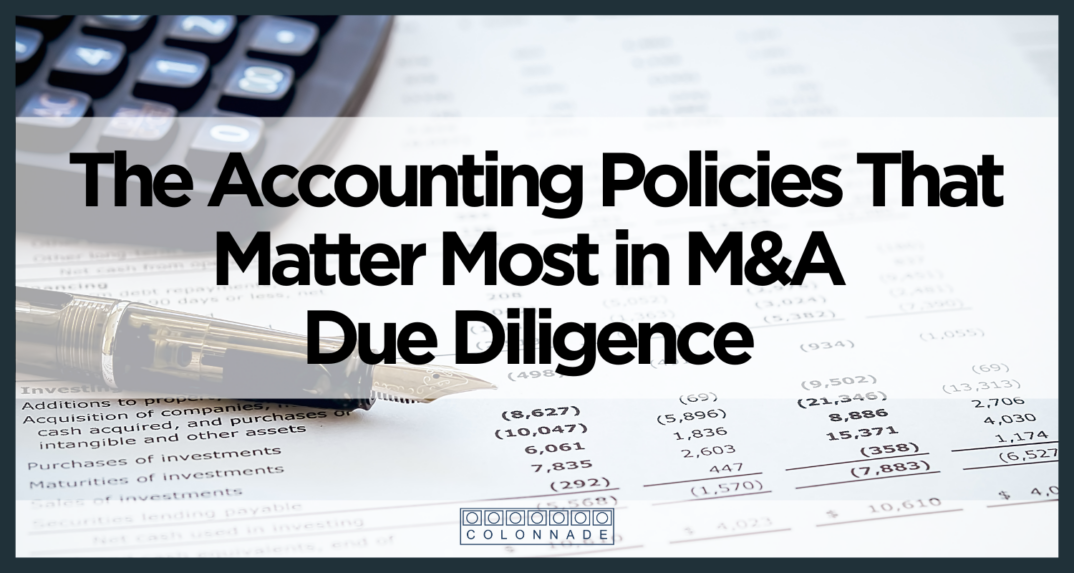The Accounting Policies That Matter Most in M&A Due Diligence

When preparing your company for sale or investment, few things are scrutinized more carefully than your financials—and at the heart of that scrutiny lies your accounting policies. These policies govern how your company records, interprets, and presents its financial position. Well-documented, consistent, and compliant accounting policies aren’t just a sign of good governance—they are essential to preserving valuation, avoiding surprises during due diligence, and expediting a smooth transaction.
At Colonnade Advisors, we’ve reviewed hundreds of financial packages through the lens of M&A. Below are the core accounting policies we expect to see in diligence—and why they matter.

1. Closing Procedures
Every company should have a defined monthly and annual closing process. This includes deadlines, roles, reconciliations, journal entries, and sign-offs.
Why it matters in M&A:
A standardized closing process demonstrates control over the financials. It reduces the risk of missed entries, ensures consistency across periods, and gives buyers confidence that the numbers presented are accurate and auditable.
2. Accounting Changes
Your policy should document any changes in accounting methods or principles over the past three years—including what changed, why, and when.
Why it matters in M&A:
Changes in accounting treatment (e.g., switching depreciation methods or revenue recognition approaches) can affect comparability and raise red flags. Transparency is key: buyers want to understand whether changes were made to improve reporting or mask trends.
3. Revenue Recognition
One of the most critical areas: your revenue recognition policy must be well-defined and aligned with ASC 606 standards.
Common examples:
- Cash-based vs. accrual-bases
- Revenue timing (e.g., at point of sale, delivery, or contract completion)
- Deferred revenue treatment for prepaid contracts
Why it matters in M&A:
Revenue is the top-line driver of valuation. Buyers need confidence that your approach is defensible, consistent, and GAAP-compliant. Misapplied policies can lead to inflated earnings and post-close disputes.
4. Capital Expenditures & Depreciation
Define when an expense is capitalized vs. expensed, with a clear capitalization threshold (e.g., technology purchases under $1,000 are expensed). Include your depreciation and amortization schedules.
Why it matters in M&A:
Inconsistent or overly aggressive capitalization can misstate EBITDA. Buyers will reclassify these during quality of earnings (QoE) analysis, which may reduce valuation.
5. Non-GAAP Measures
If you present adjusted EBITDA or other non-GAAP metrics, you should document what adjustments are included (e.g., owner expenses, one-time costs).
Why it matters in M&A:
Buyers scrutinize non-GAAP metrics to understand the true operating performance. A clearly defined policy allows for apples-to-apples comparison and improves trust in your numbers.
6. Intercompany Accounting
If your company has subsidiaries or related entities, establish policies for recording and reconciling intercompany transactions and eliminations in consolidation.
Why it matters in M&A:
Sloppy intercompany accounting leads to double counting or misstated revenue/expenses. Accurate eliminations are essential for clean consolidated financials.
7. Other Essential Policies
A well-prepared company also documents:
- Expense Reimbursement Policy – Controls personal vs. business spending
- Inventory Valuation Policy – FIFO, LIFO, or weighted average
- Accounts Receivable Allowance – For doubtful accounts or credit losses
- Fixed Assets Policy – Capitalization and depreciation rules
- Lease Accounting – ASC 842 compliance for operating vs. finance leases
- Foreign Currency Translation – If you transact internationally
- Financial Instruments & Hedging – If using derivatives or structured products
- Impairment Testing – For goodwill, intangibles, and long-lived assets
- Accruals & Provisions – For bonuses, liabilities, or tax exposures
- Tax Accounting – Deferred taxes, valuation allowances, and compliance
- Contingencies & Legal Liabilities – Disclosure of pending litigation or risks
Why it matters in M&A:
Each of these areas can materially impact a company’s risk profile, earnings quality, or valuation. Buyers will want assurance that appropriate, supportable policies are in place.
8. Mapping & Elimination Entries
Documentation of how revenue and expenses are mapped to financial categories (especially if multiple products or divisions exist) and how intercompany entries are handled.
Why it matters in M&A:
Clean mapping accelerates diligence, makes trend analysis easier, and avoids unnecessary adjustments during the QoE process.
Final Thoughts: Preparation Signals Maturity
Accounting policies are more than a back-office function. In M&A, they are a signal of operational sophistication and financial discipline. A lack of documentation creates friction in diligence, opens the door to value erosion, and can delay or derail a deal.
If you are considering a sale in the next 12–24 months, now is the time to assess and strengthen your accounting policies. Colonnade Advisors can help you prepare for diligence and ensure your financial house is in order—maximizing your company’s value and appeal to acquirers.
📩 Interested in learning more? Contact us at or reach out directly to our team.


